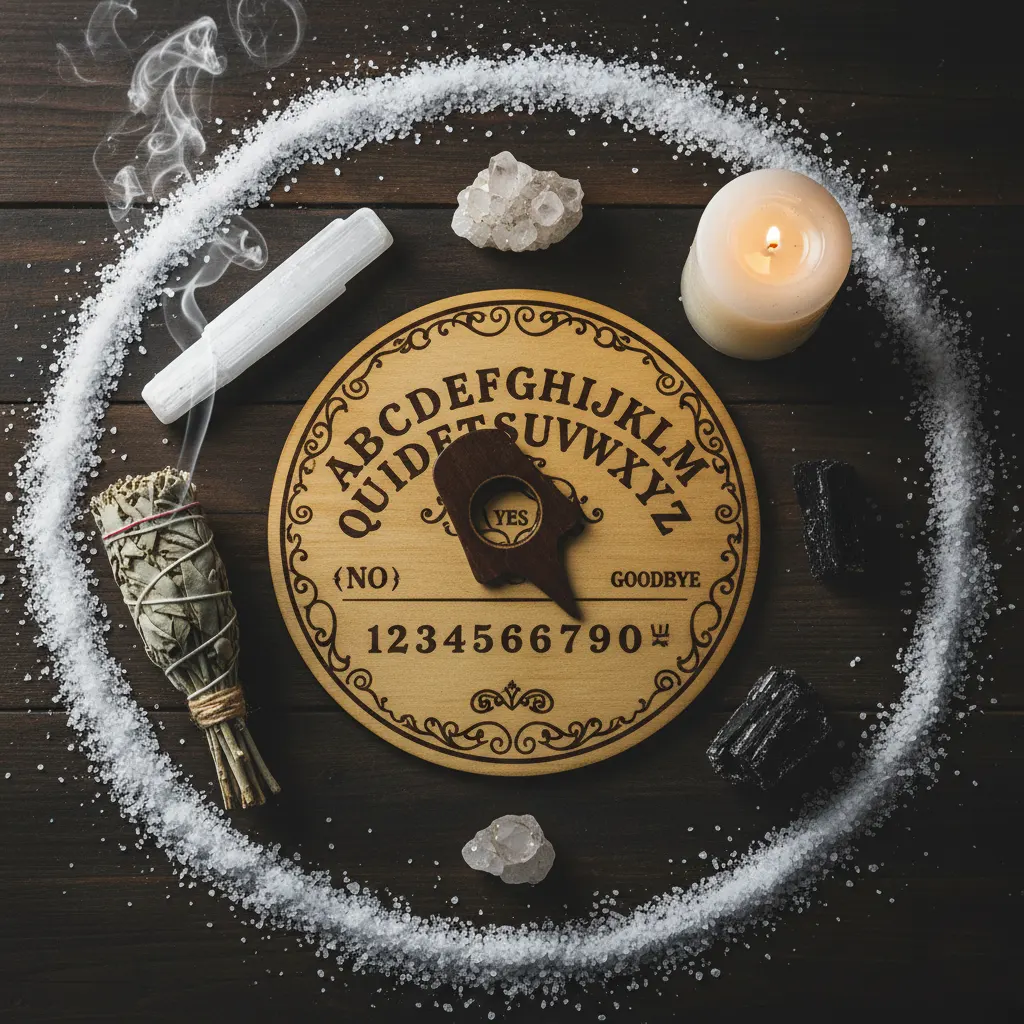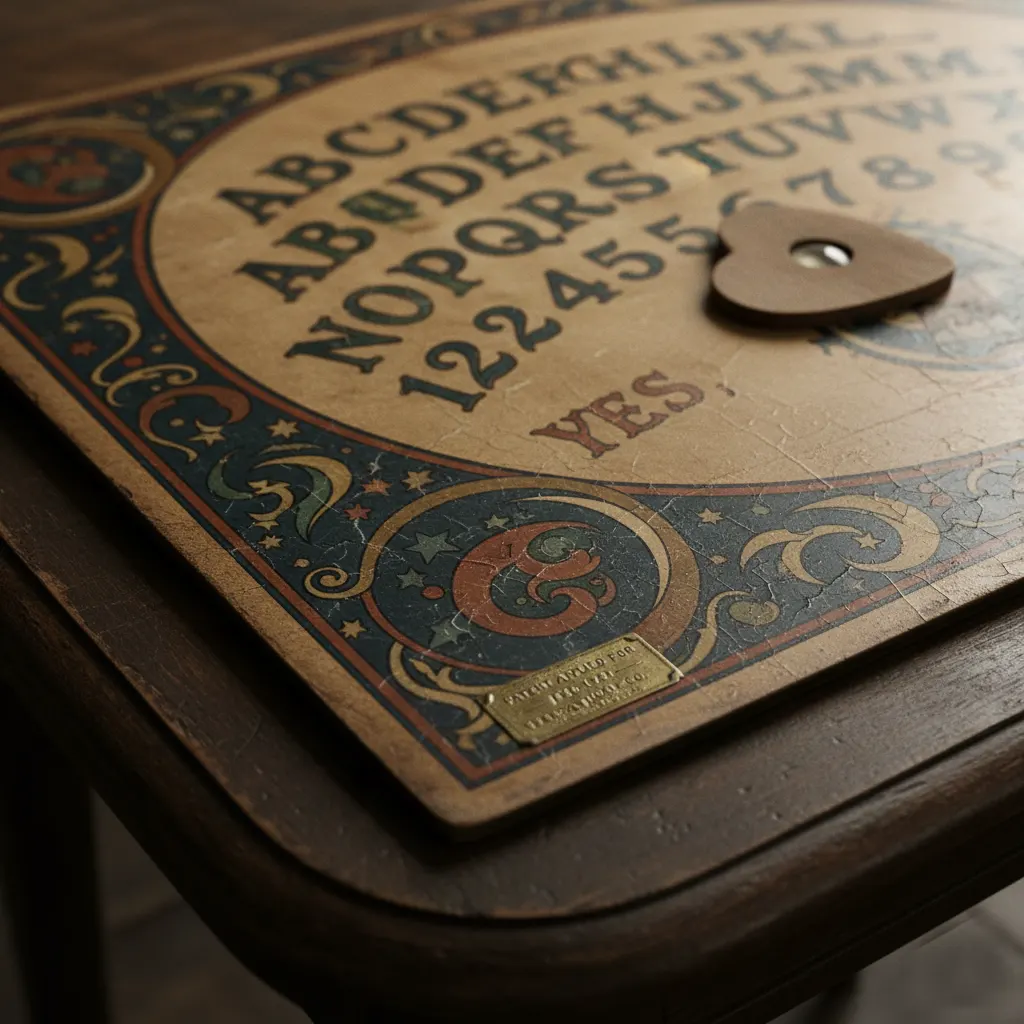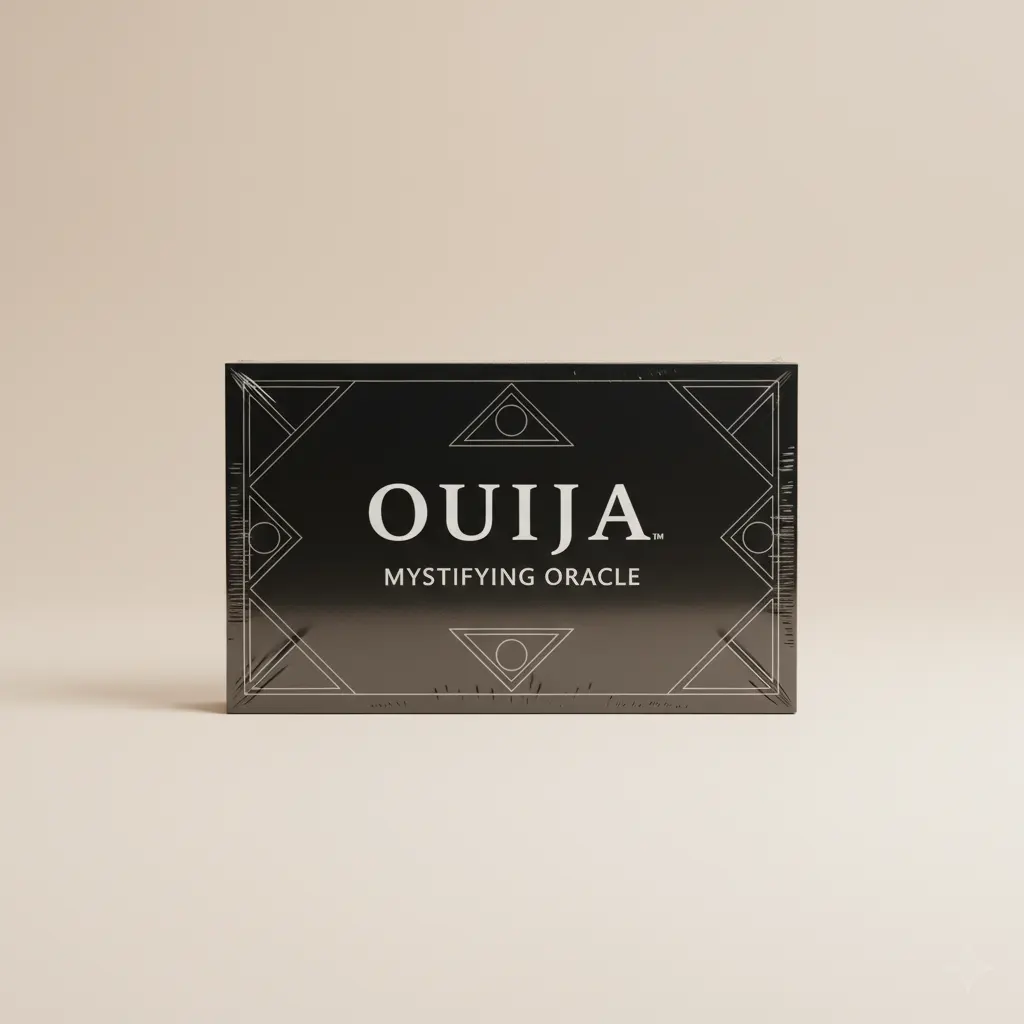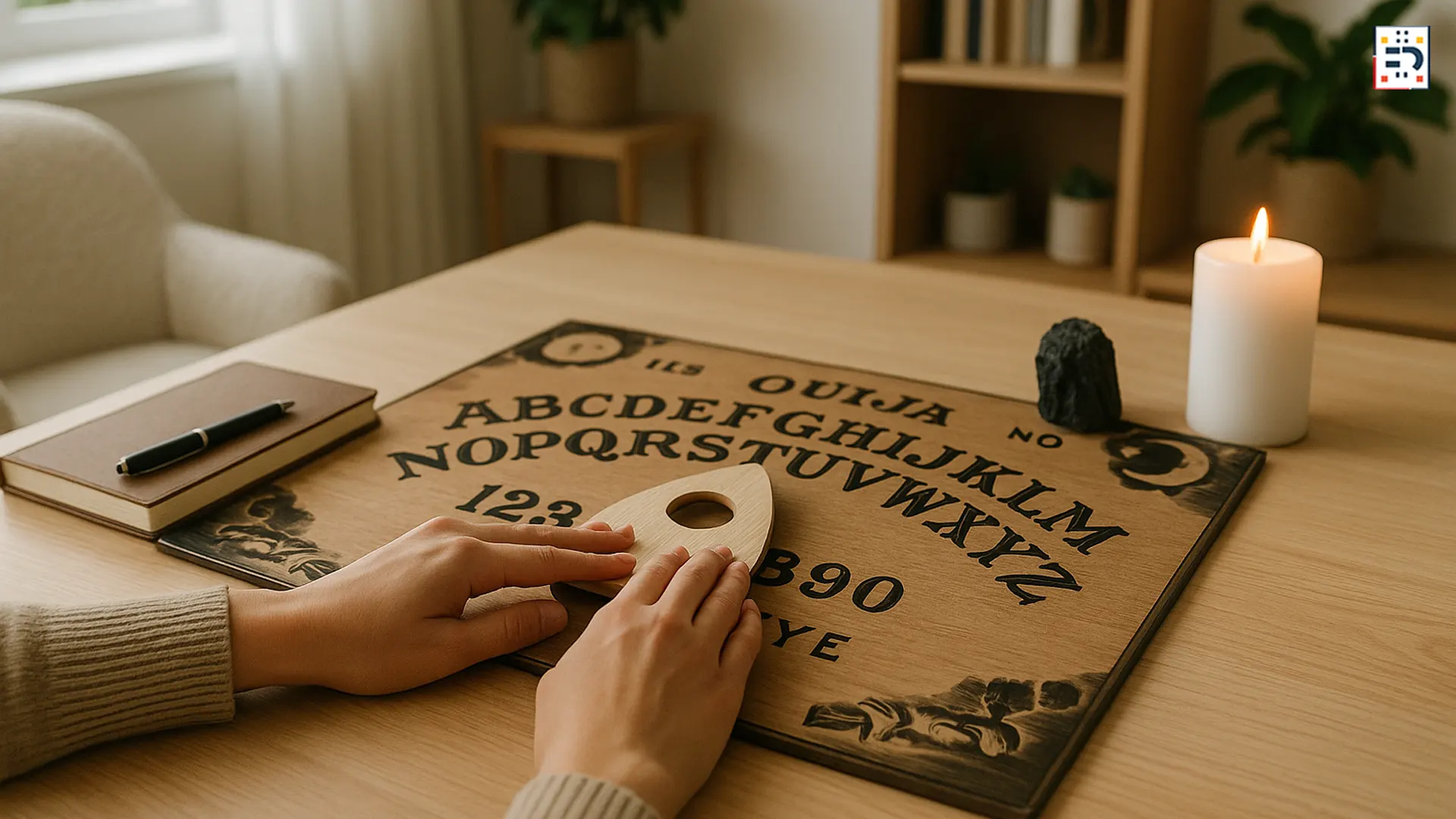Using a ouija board alone can be both fascinating and intimidating. Whether you’re interested in spirit communication, paranormal investigation, or simply curious about this mysterious talking board, learning how to use a ouija board by yourself safely is essential. This comprehensive guide covers everything from ouija board rules to protection methods, helping you conduct a safe solo spirit board session.
What is a Ouija Board? Understanding the Spirit Board
A ouija board, also known as a spirit board or talking board, is a flat board marked with letters, numbers, and symbols. Users place their fingers on a planchette (a heart-shaped pointer) that moves across the board to spell out messages. The Smithsonian Magazine has documented the ouija board’s history since its patent in 1891 by Elijah Bond.
The Science Behind Ouija Boards
According to Scientific American, the ouija board phenomenon is typically explained by the ideomotor effect—unconscious muscle movements that occur without conscious awareness. This psychological principle means your subconscious mind may be guiding the planchette, not supernatural forces.
Spiritual vs. Scientific Perspectives
- Spiritual believers view ouija boards as tools for contacting spirits, ghosts, or entities from other dimensions
- Paranormal investigators use spirit boards as part of their ghost hunting equipment
- Skeptics and scientists attribute all movements to subconscious psychological processes
- Psychology experts suggest ouija boards can reveal subconscious thoughts and anxieties

Can You Use a Ouija Board Alone? Solo vs. Group Sessions
Yes, you can use a ouija board by yourself, though it differs from group sessions. Solo ouija board sessions require extra precautions and stronger mental boundaries. According to paranormal research, solo sessions may feel more intense because:
- You have no grounding partner to provide reassurance
- The experience can feel more personal and immersive
- There’s no one to verify or question the messages received
- You’re solely responsible for opening and closing the session
Who Should Avoid Solo Ouija Board Use
According to mental health professionals at the American Psychological Association, avoid using a ouija board alone if you:
- Experience anxiety disorders or panic attacks
- Have a history of dissociative episodes
- Are currently dealing with grief or trauma
- Are under 18 years old (parental guidance recommended)
- Are highly suggestible or have difficulty distinguishing reality from imagination
Essential Ouija Board Safety Rules for Solo Sessions
1. Ouija Board Protection Methods
Before starting any solo session, establish spiritual protection:
White Light Visualization: Imagine yourself surrounded by protective white light or golden energy. This is a common practice in meditation and spiritual work recommended by many practitioners.
Sacred Space Cleansing: Use sage, palo santo, or simply open windows to cleanse your space. Native American traditions have long used sage for spiritual cleansing, though it’s important to purchase ethically sourced materials.
Protection Prayer or Affirmation: Speak your intention aloud: “I surround myself with divine protection. Only positive energies may enter this space.”
2. Setting Clear Intentions and Boundaries
Establishing firm boundaries is crucial for ouija board safety:
- Define your purpose: Are you seeking guidance, communicating with a specific person, or just exploring?
- Set time limits: Limit sessions to 20-30 minutes maximum for beginners
- Establish question boundaries: Avoid asking about death, negative predictions, or harmful information
- Create exit criteria: Decide in advance what would cause you to end the session immediately
3. Choosing the Right Time and Environment
Best Times for Solo Ouija Sessions:
- Daytime or early evening (avoid late night sessions after midnight)
- When you’re well-rested and emotionally stable
- During calm weather (some practitioners believe atmospheric conditions matter)
- When you won’t be interrupted
Ideal Environment Setup:
- Well-lit room (dim lighting is okay, but avoid complete darkness)
- Comfortable temperature and seating
- Quiet space where you feel secure
- Door unlocked (never lock yourself in during a session)

Step-by-Step Guide: How to Use a Ouija Board by Yourself
Materials Needed for Solo Spirit Board Sessions
- Ouija board (purchased or homemade spirit board)
- Planchette (pointer)
- Comfortable seating with a flat surface
- Adequate lighting (candles optional but keep safety in mind)
- Journal and pen for recording your experience
- Timer or clock visible to track session length
- Optional: sage, crystals, or other spiritual protection items
Opening the Ouija Board Session: The Right Way
Step 1: Ground Yourself Spend 5-10 minutes centering your energy through deep breathing or meditation. According to mindfulness research from Harvard Medical School, grounding techniques help maintain mental clarity.
Step 2: Cleanse Your Space Walk around your room with sage or simply open windows. State aloud: “I cleanse this space of negative energy.”
Step 3: Set Your Protection Visualize protective light around you. Say: “I am protected. Only benevolent energies may communicate with me.”
Step 4: State Your Intention Speak clearly: “I open this session with respect and positive intentions. I invite clear, honest communication that serves my highest good.”
Step 5: Position Yourself
- Sit comfortably at a table with the board in front of you
- Place the planchette in the center of the board
- Rest your fingertips lightly on the planchette (barely touching)
- Relax your arms and shoulders
Conducting Your Solo Ouija Board Session
Starting Questions:
- “Is anyone present who wishes to communicate?”
- “Are you a positive presence?”
- “What is your name?” or “How should I address you?”
Communication Guidelines:
- Keep your touch on the planchette light—don’t push or guide it
- Be patient; movement may be slow and subtle at first
- Speak questions clearly aloud
- Remain calm and neutral, even if messages are unexpected
- Take breaks if you feel overwhelmed or tired
Questions to Avoid:
- “When will I die?” or death-related questions
- Questions about harming yourself or others
- Demanding or challenging questions toward spirits
- Questions about winning lottery numbers or financial predictions
- “Are you a demon?” (never invite negative entities)
How to Properly Close a Ouija Board Session
This is the most important part. Never leave a ouija board session open, as this is believed to leave a spiritual doorway accessible.
Proper Closing Procedure:
- Announce the ending: Say aloud, “I am now closing this session. Thank you for communicating with me.”
- Move to Goodbye: Deliberately move the planchette to “GOODBYE” on the board
- Remove your hands: Take your hands off the planchette
- Close the portal: Say firmly, “This session is ended. All spirits must leave now. This doorway is closed.”
- Ground yourself: Place your feet flat on the floor, eat something, or hold a crystal
- Cleanse again: Open windows, turn on all lights, or use sage to clear the energy
- Store properly: Some practitioners recommend storing the board and planchette separately, with the board face down
Advanced Ouija Board Safety Tips and Protection Rituals
Creating a Protection Circle
Many experienced practitioners create a protective circle before solo sessions:
- Use salt, chalk, or visualize a circle of white light around yourself
- Place protective crystals at cardinal directions (black tourmaline, selenite, or clear quartz)
- Light white candles at the four corners of your space
- Recite a protection prayer from your spiritual tradition
Signs You Should End the Session Immediately
Stop your ouija board session right away if you experience:
- Rapid, aggressive planchette movement
- Threatening or disturbing messages
- Feeling physically ill, dizzy, or cold
- The planchette counting down numbers or moving in figure-8 patterns (considered negative signs)
- Messages claiming to be a demon or evil entity
- Feeling like you’re losing control of your body
- Extreme fear or panic
If any of these occur, firmly say “GOODBYE,” remove your hands, and close the session using the procedure above.

What to Do After a Concerning Session
If you had an unsettling ouija board experience:
- Ground yourself immediately: Eat food, drink water, take a shower
- Cleanse your space thoroughly: Use sage, open all windows, turn on lights
- Talk to someone: Call a trusted friend or family member
- Avoid the board: Take a break from spirit communication
- Seek help if needed: Contact a spiritual advisor, clergy member, or mental health professional
- Research demonologists: In extreme cases, look into professional paranormal investigators or spiritual cleansing services
The Parapsychological Association provides resources for understanding unusual experiences.
Common Ouija Board Myths vs. Facts
Myth 1: “Ouija Boards Are Demonic or Evil”
Fact: Ouija boards are manufactured by toy companies and sold in stores nationwide. According to the Museum of Talking Boards, they’re simply tools—their nature depends on the user’s intention and psychological state.
Myth 2: “You Must Use the Board at Midnight”
Fact: There’s no evidence that specific times are better for spirit communication. In fact, using the board when tired or at night may make you more susceptible to fear and suggestion.
Myth 3: “The Planchette Moved on Its Own”
Fact: Scientific studies consistently show the ideomotor effect explains planchette movement. Your muscles make micro-movements based on subconscious expectations.
Myth 4: “You Can Get Possessed Through a Ouija Board”
Fact: There are no verified cases of demonic possession from ouija board use. However, the experience can trigger anxiety, sleep disturbances, or intrusive thoughts in susceptible individuals.
Myth 5: “Burning a Ouija Board Releases Spirits”
Fact: This myth was popularized by horror movies. If you want to dispose of a ouija board, simply throw it away or donate it. Breaking it into seven pieces and burying it is superstition, not necessity.
Ouija Board Alternatives for Solo Spiritual Communication
If solo ouija board use feels too intense, consider these alternatives:
1. Pendulum Divination
Use a pendulum (crystal on a chain) for yes/no questions. This method feels less intimidating and is easier to control.
2. Automatic Writing
Let your hand write freely without conscious thought. This accesses your subconscious similarly to a ouija board but with more control.
3. Tarot or Oracle Cards
Card reading provides spiritual guidance without the potential intensity of direct spirit communication.
4. Meditation and Visualization
Deep meditation can help you access intuition and inner wisdom without external tools.
5. Spirit Box or Ghost Hunting Apps
Modern paranormal investigators use electronic devices designed for spirit communication. Apps like “Spirit Box” are available on both iOS and Android.
The Ghost Hunters TV show has popularized many electronic alternatives to traditional spirit boards.
Psychological Impact: When Ouija Board Use Becomes Unhealthy
Warning Signs of Problematic Use
According to clinical psychologists, stop using ouija boards if you experience:
- Obsessive thoughts about the board or messages received
- Anxiety or paranoia that persists beyond the session
- Sleep disturbances or nightmares related to sessions
- Difficulty distinguishing between board communications and reality
- Dependency on the board for making daily decisions
- Social isolation to spend more time with the board
- Declining mental health or increasing fear
The Psychology of Ouija Boards
Research published in psychological journals suggests that ouija boards can:
- Reveal subconscious thoughts and anxieties
- Create a form of self-fulfilling prophecy
- Trigger dissociative experiences in vulnerable individuals
- Provide a framework for the mind to explore fears and desires
The National Institute of Mental Health offers resources for understanding when spiritual practices may be affecting mental health.
When to Seek Professional Help
Contact a mental health professional if ouija board experiences lead to:
- Persistent anxiety or depression
- Intrusive thoughts you can’t control
- Feeling disconnected from reality
- Fear that interferes with daily functioning
- Belief that you’re being influenced or controlled by entities
The Psychology Today Therapist Finder can help locate mental health professionals who understand spiritual practices.
Ouija Board History and Cultural Significance in America
The American Origins of the Ouija Board
The ouija board was patented in 1891 in Baltimore, Maryland, during the American Spiritualism movement. According to the Library of Congress, the Spiritualist movement peaked in the mid-19th century when communication with the dead became a popular parlor game.
Key Historical Facts:
- Originally marketed as a “wonderful talking board”
- Became mainstream through Parker Brothers (now Hasbro) in 1967
- Gained renewed popularity during World War I when families sought to contact fallen soldiers
- Featured in multiple horror films, most famously “The Exorcist” (1973)
Modern Ouija Board Use in the USA
Today, ouija boards remain popular in American culture for:
- Halloween parties and spooky season entertainment
- Paranormal investigation and ghost hunting
- Spiritual exploration and divination
- Psychological self-discovery tools
- Pop culture collecting (vintage boards are valuable antiques)
The American Folklife Center documents the ongoing role of ouija boards in American spiritual practices.
Legal and Safety Considerations for Ouija Board Owners
Fire Safety with Candles
If using candles during your session:
- Place them in stable holders away from flammable materials
- Never leave candles unattended
- Keep a fire extinguisher accessible
- Follow National Fire Protection Association guidelines
Property Considerations
- Don’t use ouija boards in rental properties if it violates lease terms
- Be mindful of roommates or family members’ comfort levels
- Store boards securely away from children
- Consider neighbors if living in apartments (some may hear you speaking during sessions)
Age Restrictions and Parental Guidance
Most ouija boards are recommended for ages 8+ by manufacturers, but mental health experts suggest:
- Children under 13 should only use with adult supervision
- Teenagers should understand the psychological aspects before solo use
- Parents should discuss the difference between entertainment and reality
Frequently Asked Questions About Solo Ouija Board Use
Q: How long should a solo ouija board session last? A: Beginners should limit sessions to 20-30 minutes. Experienced users rarely exceed 45 minutes to avoid mental fatigue.
Q: Can I use a homemade ouija board? A: Yes, you can create spirit boards using paper, cardboard, or wood. The tool itself has no inherent power—it’s the intention and psychological state that matter.
Q: What if the planchette doesn’t move during my solo session? A: This is common and normal. It may take several attempts, or your subconscious may not engage with the process. Don’t force it.
Q: Is it safe to use a ouija board in my bedroom? A: Many practitioners prefer neutral spaces like living rooms. If using it in your bedroom, thoroughly cleanse the space afterward and consider whether you’ll feel comfortable sleeping there.
Q: Do I need to be spiritual or religious to use a ouija board? A: No. People from all belief systems use ouija boards. Your personal beliefs will shape your interpretation of the experience.
Q: Can I use a ouija board app instead of a physical board? A: Digital apps exist but many practitioners feel physical boards create a more authentic experience. Apps can be good for beginners to try the concept safely.
Q: What should I do with messages I receive? A: Record them in a journal for reflection. Don’t make major life decisions based on board communications. Consider messages as potential subconscious insights, not absolute truths.
Best Practices for Experienced Solo Ouija Users
Once comfortable with basic solo sessions, advanced practitioners often:
Keep a Spirit Communication Journal
Document every session with:
- Date, time, and location
- Emotional state before beginning
- Questions asked
- Messages received (word-for-word if possible)
- How you felt during and after
- Any unusual occurrences
- Moon phase and weather (some practitioners track patterns)
Develop Your Personal Protocol
Create a consistent ritual that includes:
- Same opening and closing phrases
- Personal protection methods that resonate with you
- Specific cleansing practices
- Session timing and frequency limits
- Personal rules about question types
Join Ouija Board Communities
Connect with others online through:
- Reddit communities (r/Paranormal, r/Ouija)
- Facebook groups dedicated to spirit communication
- Local paranormal investigation groups
- Spiritual development circles
Note: Be discerning about online advice. Not all information about ouija boards is accurate or safe.
Continue Learning
Expand your knowledge through:
- Books on Spiritualism and paranormal investigation
- Documentaries about spirit communication
- Workshops on mediumship and psychic development
- Psychology courses on consciousness and the subconscious mind
Resources for Safe Ouija Board Practice
Recommended Reading
- “Ouija Gone Wild: Shocking True Stories” by Rosemary Ellen Guiley
- “The Skeptic’s Guide to the Paranormal” for balanced perspectives
- “Talking to Heaven” by James Van Praagh (for spiritual context)
- Psychology articles on the ideomotor effect
Online Resources
- Skeptical Inquirer – Scientific perspectives on paranormal claims
- The Atlantic – Articles on ouija board cultural history
- Mental Floss – Fun facts and historical information
- Local paranormal investigation groups in your area
Emergency Resources
If you experience mental health concerns related to ouija board use:
- National Suicide Prevention Lifeline: 988 (call or text)
- SAMHSA National Helpline: 1-800-662-4357
- Crisis Text Line: Text HOME to 741741
- Your primary care physician
- Local mental health crisis centers
Responsible Solo Ouija Board Use
Using a ouija board alone can be a fascinating journey into spirituality, psychology, or simply curiosity about the unknown. Whether you believe you’re contacting spirits or exploring your subconscious mind, safety should always be your priority.
Remember these key points:
✓ Always establish protection and set clear boundaries ✓ Never skip the proper closing procedure ✓ Trust your instincts and end sessions if uncomfortable ✓ Maintain perspective and don’t let boards control your life ✓ Prioritize your mental health over spiritual curiosity ✓ Keep sessions time-limited and infrequent ✓ Document experiences for pattern recognition ✓ Seek help if you experience concerning symptoms
The ouija board remains one of America’s most intriguing paranormal tools. Used responsibly with proper safety measures, solo sessions can provide unique insights into your subconscious mind, offer spiritual exploration, or simply satisfy your curiosity about spirit communication.
Whatever your beliefs about ouija boards—whether you view them as portals to the spirit world or psychological tools—approaching them with respect, caution, and clear boundaries ensures the safest possible experience.
Ready to start your solo ouija journey? Remember: you’re always in control, you can stop anytime, and your safety matters most.
Disclaimer: This article is for informational and entertainment purposes only. The author and publisher are not responsible for any consequences arising from ouija board use. This content does not constitute medical, psychological, or spiritual advice. If you experience mental health concerns, please consult qualified professionals. Always use common sense and prioritize your wellbeing above curiosity.
#OuijaBoard #SpiritBoard #ParanormalSafety #SoloSession #BeginnerGuide #OuijaTips #SpiritualProtection #GhostHunting #Mindfulness #ParanormalInvestigation


